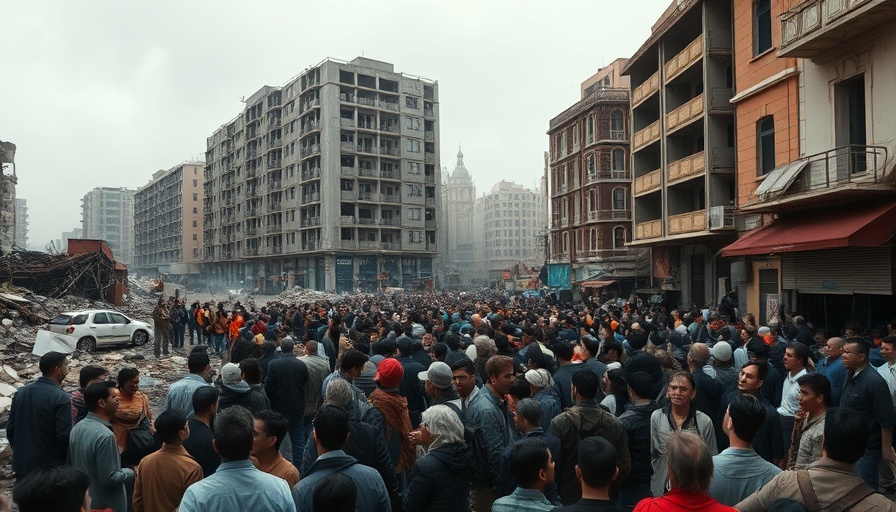
Recent Escalation: Understanding the Impact of Violence in Gaza
In a significant escalation of violence in Gaza, Israeli military forces conducted multiple airstrikes throughout the region on Palm Sunday, targeting places essential for civilian life, including hospitals and residential areas. The most alarming of these strikes occurred at the Al-Ahli Hospital in Gaza City, a facility critical for providing care to the local population, particularly in this time of heightened conflict. The attack not only resulted in the tragic deaths of at least 21 individuals, including children, but also raised serious ethical considerations regarding the safety of civilians in wartime situations.
The Role of Al-Ahli Hospital: A Lifeline for the Community
The Al-Ahli Hospital, operated by the Diocese of Jerusalem, symbolizes hope and resilience in the face of adversity for countless families in northern Gaza. With over 100 patients and medical staff relying on its services, the recent airstrike severely hampered its operations, causing a humanitarian crisis as patients struggled to receive necessary medical attention. The hospital's director, Dr. Fadel Naim, detailed the devastation, highlighting not only the physical damage but the emotional toll this incident has taken on both staff and patients alike. This event underscores the critical importance of healthcare facilities during conflict and the need for their protection under international law.
Understanding the Context: The Broader Israeli-Palestinian Conflict
This recent escalation can be understood within the larger context of the Israeli-Palestinian conflict, which has seen recurrent violence and deep-seated grievances. Amid relentless military action, accusations and counter-accusations abound regarding the motivations behind these strikes. The Israeli government claims the attacks were aimed at dismantling Hamas’ command and control centers, often located near civilian infrastructure, a reality that complicates the moral landscape of modern warfare.
Misinformation and the Digital Age: The Challenge of Perception
The fight for narrative control amidst this conflict has profound implications. Israeli officials stated that the airstrike targeted Hamas operations within the hospital, alleging that terrorists took refuge within its walls. In contrast, Hamas categorically denied these accusations, illustrating the complexities of experiencing and interpreting events during warfare. With social media platforms inundated with conflicting information, distinguishing fact from fiction has become increasingly challenging for those trying to grasp the realities on the ground.
Humanitarian Response: The Need for International Oversight
The destruction of a facility as crucial as Al-Ahli during an already tense time raises urgent calls for international intervention and oversight in conflict zones. Humanitarian organizations and global leaders have emphasized the necessity of establishing neutral zones for medical facilities and pressuring conflicting parties to abide by humanitarian laws. Protecting healthcare in conflict areas is pivotal to saving lives and preserving medical ethics, which are often put to the test in the heat of battle.
Looking Forward: Possible Outcomes and Future Predictions
As violence escalates, what comes next for Gaza and Israel remains uncertain. Analysts predict that without meaningful dialogue and interventions from international parties, the cycle of violence is likely to continue. The implications are dire, not just for the immediate safety of civilians in Gaza, but for the broader geopolitical landscape. Less stability could lead to increased refugee flows and broader regional implications that can affect global security dynamics.
Taking Action: The Role of the Global Community
This situation calls for proactive measures from the international community. A commitment to peace building, combined with pressure on both sides to engage in constructive dialogue, is essential for de-escalation. Citizens around the globe are encouraged to raise awareness, support humanitarian efforts, and advocate for policies that favor diplomatic resolutions to the ongoing conflict.
In conclusion, as tensions continue to rise in Gaza, it becomes increasingly critical for the global community to pay attention, to understand the implications of these events, and to take meaningful action to protect vulnerable populations caught in the crossfire. The protection of hospitals and civilians must remain a priority in any conflict to uphold the principles of humanity.
 Add Row
Add Row  Add
Add 




 Add Row
Add Row  Add
Add 

Write A Comment